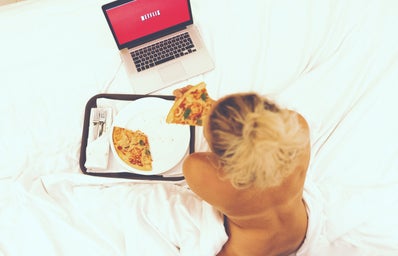Netflix released a trailer for its upcoming series Insatiable on Thursday, and though the preview of the show certainly got people talking on social media, the reason probably wasn’t one that the streaming giant wanted.
In what’s being billed as a “dark comedy,” Insatiable follows Patty (played by Debby Ryan), a high school student who is bullied and dubbed “Fatty Patty” because of her size. After being punched in the face by one of the people participating in this bullying, Patty spends a summer with her jaw wired shut, and loses a dramatic amount of weight as a result. Upon returning to school, Patty realizes she’s now conventionally attractive — so she sets out on a journey to exact revenge on everyone who once mistreated her.
This story’s full of some crazy shit. @debbyryan is Insatiable. August 10. Only on Netflix. pic.twitter.com/MrsWMrKyYf
— insatiable (@insatiable_) July 19, 2018
Many people took issue with the show’s supposed use of the tired “formerly fat” trope, which has made appearances in shows like One Tree Hill, Pretty Little Liars, Glee, and more. Revelist described this character archetype best: “You’ve heard the story in movies and on television over and over and over again: chubby girl who is constantly bullied and ignored becomes thin and, coincidentally, important.”
this is a good example of why i grew up insecure and thought i would never be loved because of my size. give us a story where the fat girl stays fat, struggles, but learns to accept her body and overcomes societal standards. #insatiable https://t.co/v9WchYgKVG
— lacey (@geamxs) July 19, 2018
This new Netflix bullshit, Insatiable, can 10000% fuck off. Is it trying to ride the ~body posi~ wave? Does it think it’s radical? Or does it know it’s bullshit and doesn’t care?
— Bert (@bethanyrutter) July 19, 2018
Oh @netflix you really fucked up with one…
“While my classmates were out losing their virginity, I was at home stuffing ANOTHER hole.”
Really?!? Ooooo bitch, I’m on the verge of a Netflix boycott. #netflix #fatshaming #Insatiable https://t.co/QE4r3JY1Sz— Amanda Hunt (@tinuvielly) July 19, 2018
yeah, don’t watch the utter bs that @insatiable_ is gonna turn out to be. anything that starts with a thin actress in a fat suit who loses weight and becomes desirable in HS is toxic
love, a “fatty” with a brain pic.twitter.com/JB3sJYWcF3
— lydia hephzibah ? (@lydiauthor) July 19, 2018
Though the main argument against the show is its alleged perpetuation of the notion that you can only be desirable or have a sense of self-worth when you’re thin, some have also taken issue with the fact that Ryan wears a fat suit for her portrayal of “Fatty Patty.”
The show Insatiable on @netflix looks like a piece of utter trash. Don’t watch shows where people wear fat suits. Don’t watch shows where they try to turn fat phobia and hatred into a joke.
— Amanda Levitt (@FatBodyPolitics) July 19, 2018
Do not watch Insatiable on @netflix. Let it burn to the ground. Watch Dietland instead. Let fat people play fat characters. Let us tell our own stories.
— Amanda Levitt (@FatBodyPolitics) July 19, 2018
Instead of hiring thin actresses to play fat characters in a fat suit how about we hire fat actresses ?♀️?♀️?♀️ and while we’re at it let’s not promote that the only way to be happy is through losing weight ?♀️ @insatiable_
— Lizzie Gruhl (@lizzie_gruhl) July 19, 2018
This is about a fat girl who is treated like shit and then loses weight and gets revenge on people because she’s thin now. It stars a thin actress wearing a fat suit. Please note that you do not have to become “hot now” to live your best life. Thank you for coming to my TED talk. https://t.co/zRRWBXs0I6
— Kristin Chirico (@lolacoaster) July 19, 2018
Plus, the main reason Patty loses the weight she does is because she wasn’t eating.
it
• promotes fat-shaming
• teaches young people that if you don’t eat, you’ll become skinny and desirable
• romanticizes revenge fantasies
• shows that you’re only deserving of love and popularity if you fall into society’s definition of beauty— jenna 106 (@jennajozeph) July 20, 2018
Just saw the trailer for Insatiable. I hear the actors and team behind it are asking us to look beyond the trailer but trailers are supposed to entice us – this trailer repelled me. How in any world is weight loss from a jaw being forced shut inspiring? Do they know what implies?
— Nabela (@Nabela) July 20, 2018
people wonder why young girls develop eating disorders and then make shows like insatiable where they imply starvation from a wired jaw is what made her skinny and pretty lmao gross
— tiff (@VALENTlNOBIX) July 19, 2018
Some people were so upset with Insatiable that an online petition calling for Netflix to cancel it quickly made the rounds on the internet. It currently has more than 60,000 signatures. “For so long, the narrative has told women and young impressionable girls that in order to be popular, have friends, to be desirable for the male gaze, and to some extent be a worthy human…that we must be thin,” the petition reads. “The toxicity of this series, is bigger than just this one particular series. This is not an isolated case, but part of a much larger problem that I can promise you every single woman has faced in her life, sitting somewhere on the scale of valuing their worth on their bodies, to be desirable objects for the male gaze. That is exactly what this series does. It perpetuates not only the toxicity of diet culture, but the objectification of women’s bodies.”
Florence Givens, the petition’s author, continued: “This series needs to be cancelled. The damage control of releasing this series will be far worse, insidious and sinister for teenage girls, than it will be damaging for Netflix in their loss of profit.”
“The release is set to be the 10th of August, we still have time to stop this series from being released, and causing a devastation of self-doubt in the minds of young girls who will think that to be happy and be worthy, they need to lose weight,” Givens wrote. “This series will cause eating disorders, and perpetuate the further objectification of women’s bodies. The trailer has already triggered people with eating disorders. Let’s stop this, and protect further damage.”
In a statement to BuzzFeed News, Givens reiterated her disdain for Insatiable‘s “toxic message.”
“[The show] makes fatness look like something a woman must ‘overcome’ and this is an incredibly toxic message to be drilling into the minds of young, impressionable women,” she said.
Ryan has since responded to the backlash in an Instagram post. “As someone who cares deeply about the way our bodies, especially women’s, are shamed and policed in society, I was so excited to work on Insatiable because it’s a show that addresses and confronts those ideas through satire,” Ryan’s note began. “Satire is a way to poke fun at the hardest things, bring darkness into the light, and enter difficult conversations.”
“I have to laugh at my pain, otherwise I’ll dissolve and weep and get stuck instead of working through it,” Ryan continued. “It’s a coping mechanism and, for a lot of people who are telling these stories, a healing mechanism. Over the last few days I’ve seen how many voices are protective and fiercely outspoken about the themes that come into play in this story. I’m grateful for that, and comforted by it, because I want those stories told right too.”
“Twelve years into my own struggles with body image, struggles that took me in and out of terrible places I never want to go again, things I choose every day to leave behind, I was drawn to this show’s willingness to go to real places about how difficult and scary it can be to move through the world in a body, whether you’re being praised or criticized for its size, and what it feels like to pray to be ignored because it’s easier than being seen,” Ryan said. “It was very important to Lauren Gussis, our writer and showrunner from whose brain and heart and life the character of Patty was born, as well as to me, that any scenes where Patty was heavier don’t use her size as a punchline, and never justify the abuse she suffers. The humor is not in the fat-shaming (or thin-shaming, slut-shaming, virgin-shaming, ‘glam-shaming,’ for fans of Arie’s season of the Bachelor…). The redemption is in identifying the bullies and saying ‘this is not okay.'”
“Patty had the same brain, the same sense of humor and style, soul and heart, the same chucks, but felt like she didn’t matter to anyone until she was thin. She didn’t have the same opportunities, and she was treated worse, which is what triggers her rage,” Ryan continued. “And Patty doesn’t starve herself skinny. She snaps and undergoes a physical transformation, but it doesn’t make her more happy. We’re not in the business of fat shaming. We’re out to turn a sharp eye on broken, harmful systems that equate thinness with worth.”
“I want more women to keep telling their stories and through that, face the gutting realities that bog us down every day. I’m grateful to be on a show by whip-smart female creators that aims to dissect the insidious pressures we place on young women,” Ryan wrote, concluding the note. “I hope fans will wait and watch the show before passing judgment. If you go for this ride, I think you’ll recognize both yourself and the things that make you mad about our fractured and beauty-obsessed culture.”
Alyssa Milano, who also stars in the show, took to Twitter to defend it. “We are not shaming Patty,” she wrote. We are addressing (through comedy) the damage that occurs from fat shaming. I hope that clears it up.”
We are not shaming Patty. We are addressing (through comedy) the damage that occurs from fat shaming. I hope that clears it up. Also, this article does a good job of explaining it more: https://t.co/WoR8R7TjqR #Insatiable https://t.co/GFkDdsn1uh
— Alyssa Milano (@Alyssa_Milano) July 19, 2018
Milano also linked to a Teen Vogue article that discusses Insatiable‘s premise. In the piece, the show’s main writer, Lauren Gussis mentioned that Insatiable is partly based on her own experiences. “This is my expression of my own process. My own pain,” she told Teen Vogue. “And so I would never mock myself in a way that wasn’t loving.”
Gussis also tweeted about giving the show a chance.
This is my truth. @insatiable_ pic.twitter.com/xbs3YtueCQ
— Lauren Gussis (@GussisLauren) July 21, 2018
Insatiable is currently set to premiere on Netflix August 10.


